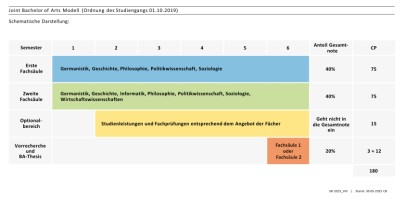Soziologie
Bachelor of Arts (als Joint Bachelor of Arts in den Fächern X und Y); tuition language: German
The following English language content is for information purposes only. The legally binding content can be found on the corresponding German website.
Description
The Bachelor of Arts programme in the special form of Joint Bachelor of Arts in Subjects X and Y allows to combine two different subjects/components.
Soziologie addresses the social order of human life and the institutions created thereby: cities, businesses, organisations, universities, marriages, familial relations and friendships. All of these social phenomena are the subject of sociological research in regard to their social relativity, their structure, function and meaning as well as their potential for change and development.
Sociology as a discipline offers a variety of instruments and methods for this. It also has branched out into a multitude of different schools of thought that allow for various perspectives on the matter. Students learn scientific methods and and how to critically analyse social contexts and interrelations. The study of sociology teaches competences for analysing, presenting and influencing social processes.
Working areas or focus areas of the Institute for Sociology at Technical University of Darmstadt are General Sociology; Organisation Sociology; Culture and Knowledge Sociology; Empirical Social Research; Gender Relations; Education and Lifestyle as well as Sociology of Space (city).
The Joint Bachelor of Arts consists of two different subjects/components. Thus, in addition to Sociology, a second subject has to be chosen (see below).
Module Handbook (opens in new tab)
Study Regulation of Joint Bachelor of Arts in the Subjects X and Y
Is the programme right for you? Find out!
Come and see, touch and feel, meet and greet:
hobit: Hochschul- und Berufsinformationstage in Darmstadt (orientation event; January and May)
University visits, labs, internships, and more
Or online:
Online Self-Assessment for selecting a course of study
Kann ich MINT?
For listeners:
Perspectives on careers:
Career guidings with the #studentsofTUdarmstadt
TU Darmstadt Career Service
| Semesters | 6 |
| Language | German. Individual courses/modules may be offered in English. Please be aware that scientific literature is be read and edited in English or other foreign languages. |
| Start of studies | Winter semester |
| Internship | Optional career-oriented internship |
| Admission requirements | Formal and language requirements for applicants with international qualifications. |
| Application |
Application portal and application deadlines Formal and language requirements for applicants with international qualifications |
| Good to know |
Costs and budget Pre-Courses, orientation week, getting started Preparatory courses for international students Minimum requirements by the end of the second semester Study Abroad Part-time studies TU Darmstadt Career Service Alumni careers |



